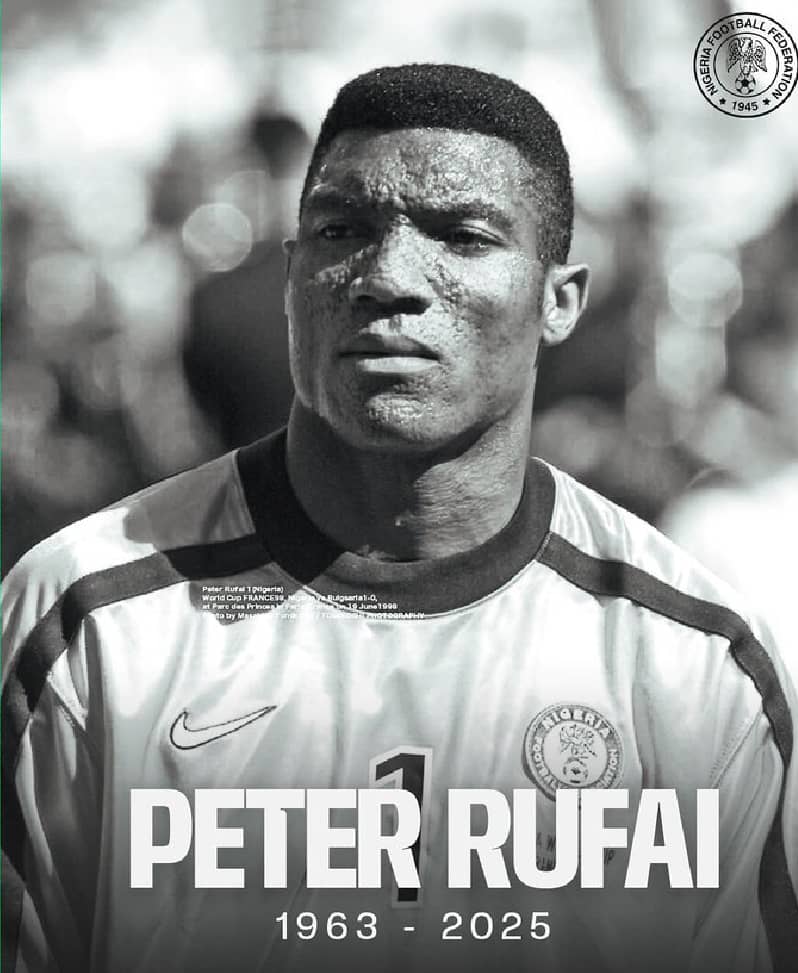By Steve Ogah
Peter Rufai is dead and buried in a physical sense of the word, but his place in Nigeria’s soccer history remains animated and creamed with heroism, glowing with the splendor of his remarkable goalkeeping fineness and values, his inimitable place in the country’s soccer culture a solid testament to his many years of service to the country and the sport he loved with all his heart.
Arguably, Peter Rufai will go down as one of the most dependable, agile, and cultured goalkeepers in Nigeria’s soccer history, his humility, skills, and model of excellence serving to inspire a new generation of goalkeepers and athletes. Again, it will not be tough for analysts to rank him among the best of the best, thrusting him to the frontlines, his profile written in colorful adjectives when the country’s goalkeeping history is eventually bound in black and white.
Backed by raw and impressive talents, hard work, and perseverance, the gifted Peter Rufai made his mark felt locally at Stationery Stores football club and Femo Scorpions of Lagos. Thereafter, it wasn’t long before he saw the need to ply his trade further afield from Nigeria. From Benin Republic to Portugal, Belgium, Spain, and Holland, Rufai displayed his excellence for a number of club sides. Notably, he was at Dragons de I’Queme, Farense, Sporting Lokeren, Deportivo La Coruna, and Go Ahead Eagles respectively, where it wasn’t tough for coaches and fans to agree that he was truly made for the game. In more ways than one, Rufai was a darling of soccer fans in Nigeria and elsewhere because he combined his talents with humility, elevating himself above the disconcerting mix of petty politics and divisive national rhetoric.
A man made for grand and historical moments, Peter Rufai was in the party when the country began its quest for a place at USA 1994. Eventually, Nigeria won its first place at the FIFA senior World Cup after a hard-fought 1-1 draw away to Algeria in 1993. Although Rufai missed the final qualifying game, expectedly, he was in goal during Nigeria’s first FIFA World Cup match at USA 1994. And he didn’t disappoint as the country overwhelmed Bulgaria by 3-0 at the capacity-filled Cotton Bowl stadium, Dallas, Texas. Overall, he played in all of Nigeria’s four matches at the tournament, conceding four goals, averaging an impressive one goal per game. While it wasn’t tough for many analysts to reckon with the Super Eagles as a pleasurable team to watch, some still recognized Peter Rufai as a goalkeeping boulder that ensured the team wasn’t disgraced at its inaugural World Cup. He gave confidence to his line of defenders, saving the day on a number of occasions, playing a huge part as Nigeria exited USA 1994 in the round of 16.
With Nigeria missing a place at the South Africa 1996 African Cup of Nations due to the politics and diplomacy of a turbulent political period, the country missed a rare moment to see Peter Rufai replicate the brilliance he had exhibited two years prior at Tunisia 1994, where Nigeria won her second African Cup of Nations after beating Zambia by 2-1. But Peter Rufai would have another chance to put his patriotism and talents on display.
At the France 1998 FIFA World Cup, Rufai had begun to lose some of his defining starch and color, age catching up with him, his restless life between the posts showing in very vivid terms. Yet, he gave his all for the colors he wore and the badge on his shirt. At the end, Peter Rufai gave ground to age and time, his juice giving out on French soil as the entire team fell belly up in the knockout stage. He conceded two goals against Spain, kept a clean sheet against Bulgaria, before going on to concede three against Paraguay, and four against Denmark as Nigeria crashed in the round of 16 once again.
Understandably, Peter Rufai was already in winter at France ’98 after representing the country for more than a decade with unrelenting passion and evident patriotism. Nonetheless, he rightfully earned his stripes as one of Nigeria’s goalkeeping legends, a defensive rampart that resisted many offensive assaults when it mattered most. A gentle giant in goal, Rufai retired to a quiet life of reflection and service to the sporting community, giving his time and talents to those in need of goalkeeping guidance and direction in life.
Assuredly, Peter Rufai will go down in history as one of the greatest athletes to ever represent Nigeria, his place in the country’s goalkeeping archives splendid with the several honors he justifiably earned. He gave a respectable name to the No. 1 shirt, easily earning a golden place in the heart of his fans. He imbued confidence into the hearts of many whenever he marched out to represent the country, creating that supernatural feeling that he was unbeatable whenever he was in fine form.
Many soccer fans recognize that Peter Rufai’s demise on July 3 was simply a transition into immortality. In more ways than one, Peter Rufai was much more than a goalkeeper, he was a balancing force, an extinguisher with a potency that put out countless fires in goal. Indeed, he was a composed heap of nerves. On numerous occasions, he rose in time whenever the task of saving the team flushed before him after his last line of defense had been breached. He was a model of excellence, humility, and talents. Still, many soccer fans agree it will remain tough to erase Peter Rufai’s inspiring memory because he was a profound national goalkeeping spectacular with immaculate class, a heroic model and unifying figure for a country that is sometimes alienated by tribal and religious sentiments. Peter Rufai’s memory will serve as an inspiration to many for a longtime to come.

